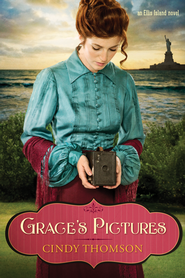 The widespread prejudice against the Irish, the horrible tenements for the thousands of immigrants, the corruption in the police force, the rampant crime - all these sad aspects of the early twentieth century are clearly depicted in the book. However, Thomson does a good job of balancing the bad with the good - charities that take in immigrants and help find them employment as they settle into a new country, police who were true to their calling and actively worked to clean up the dangerous parts of town. While she does not paint a particularly rosy picture of New York City circa 1900, neither does she depict it as a place beyond redemption and hope.
The widespread prejudice against the Irish, the horrible tenements for the thousands of immigrants, the corruption in the police force, the rampant crime - all these sad aspects of the early twentieth century are clearly depicted in the book. However, Thomson does a good job of balancing the bad with the good - charities that take in immigrants and help find them employment as they settle into a new country, police who were true to their calling and actively worked to clean up the dangerous parts of town. While she does not paint a particularly rosy picture of New York City circa 1900, neither does she depict it as a place beyond redemption and hope. To my surprise, there was relatively little romance to the novel, but it fit better this way. While some interest is quite evident, Thomson takes it slow and does not push Grace and Owen into a sudden relationship. Over the course of the book, Grace has to overcome her deep-seated fears of the police before she can look beyond Owen's uniform and see a person, and only after that would she be able to see a candidate for a romance, so I applaud Thomson for taking the more sensible and realistic route. There is sufficient excitement in the tale anyway to hold the reader's attention.
A major theme in the book is separating truth from lies. Grace spent her childhood with an abusive father who would have her believe she is incompetent and worthless - lies abounding from the evil one. However, her Mother impresses the truth that, "You are smart. You are important. You are able." Even if no one else cared - and a great many people prove they do - Grace truly is important to God, and he made her smart and able to perform any task laid before her. As Grace proves, it is a choice to be made daily which she will listen to: the lies or the truth. How often do we fall for similar lies? Half the time no one has to say them out loud - we just assume that "no, I'll never be able to do that," or "I'm not smart enough," and we let those lies keep us from trying in the first place; the truth is that God has equipped us in so many ways, and how will we know what we can do until we try?
Since this is the first book in the series, it is hard to say if Grace's story will continue, or if hers is done and another heroine will take the stage - the ending leaves potential for both, I feel. Not knowing a lot about immigration during that time, I found it an interesting read with a clever premise. There is much to think about and apply.
Ellis Island
1. Grace's Pictures
2. Annie's Stories
No comments:
Post a Comment